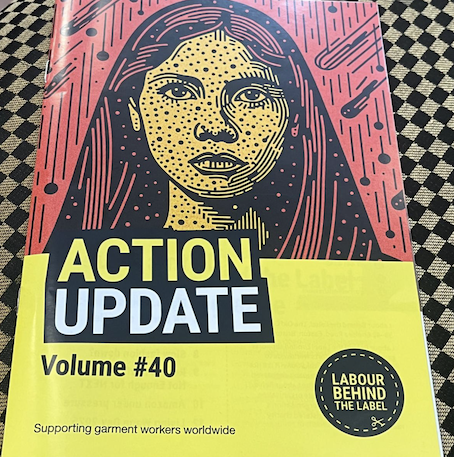Fair Work and Supply Chains in the UK Garment Industry: Fixing the Foundations for a Fairer Future
Leicester’s Highfields Community Centre became a hub of collaboration and critical discussion this week as leading voices from across the garment and fashion industry gathered for the “Fair Work and Supply Chains in the UK Garment Industry” event on 6th November.
 Organised by the University of Leicester, University of Nottingham, Transform Trade, and the Highfields Centre as part of the ESRC Festival of Social Science, the day brought together researchers, manufacturers, enforcement officials, and workers to tackle one of the most pressing issues in UK manufacturing: how to make fashion fair, ethical, and sustainable from stitch to store.
Organised by the University of Leicester, University of Nottingham, Transform Trade, and the Highfields Centre as part of the ESRC Festival of Social Science, the day brought together researchers, manufacturers, enforcement officials, and workers to tackle one of the most pressing issues in UK manufacturing: how to make fashion fair, ethical, and sustainable from stitch to store.
Leading Voices on Fair Work
The event was led by a panel of key experts:
- Professor Nik Hammer, University of Leicester – specialist in work and employment
- Hilary Marsh, Garment Policy Advisor, Transform Trade
- Dr Sabina Lawreniuk, Principal Research Fellow, University of Nottingham
- Ellias Mussa, Social Welfare Advocacy Worker, Highfields Centre
- Fatimah Zaahra Li, Deputy Head, Highfields Centre
They were joined by Jenny Holloway, Founder of Fashion-Enter Ltd and Chair of the Apparel and Textile Manufacturers Federation (ATMF), who represented the voice of UK garment manufacturers working to uphold ethical standards while sustaining domestic production.
Through workshops, research presentations, and a compelling photo exhibition, the event explored the realities of working and producing within the UK garment sector. New findings shared by Transform Trade revealed deep structural challenges that continue to shape supply chain practices.
Key stats from Transform Trade highlight how purchasing practices by major brands impact suppliers and workers alike:
Order Changes and Costs
- 67% of manufacturers said brands do not cover the cost of changes made after orders were agreed.
- Over 30% reported being penalised for late delivery – even when delays stemmed from those brand-imposed changes.
- More than 25% said they receive changes after production has begun, with 77% of those changes relating to design.
Impact on the Workforce
- 29% reported hiring more contract workers to handle sudden order increases.
- 80% said they had to increase overtime.
- 60% had to cut workers’ hours due to cancelled or reduced orders, and 65% reduced working days because of contract changes.
Audits and Costs
- 79% said brands now require formal audits before placing orders.
- 100% reported that suppliers bear the full cost of these audits – yet only 6% were guaranteed future orders as a result.
- Fewer than one in three reported receiving local support to help meet these new compliance requirements.
Lead Times and Payments
- Average lead times have halved since 2019, falling from 30 to just 14 days.
- Payment terms have lengthened, with the average rising from 30 to 45 days.
- 45% said brands extend payments beyond agreed timelines.
- Only 13% said they had never experienced an order cancellation.
These pressures create volatility for manufacturers and instability for workers – intensifying financial risk across the supply chain.
Fixing the Foundations
In his session, Professor Nik Hammer of the University of Leicester emphasised the need to “fix the foundations” of the garment sector. He highlighted that while numerous initiatives exist to support workers and improve compliance, the enforcement landscape remains fragmented and under-resourced.
“We have a hybrid enforcement system – part public agencies, part social auditing – but these do not always connect effectively,” Hammer noted. “Manufacturers also face barriers to upgrading their operations and investing in productivity. A fairer industry must address these systemic challenges, not just symptoms of non-compliance.”
The Policy Perspective
The discussion also connected to the recent Lessons Learned from Operation Tacit report, presented by Margaret Beels, Director of Labour Market Enforcement. Beels’ findings underlined that while Leicester’s garment sector does experience some non-compliance, previous claims of widespread exploitation were overstated and that building a “vibrant, compliant, and high-value garment industry” remains both possible and necessary.
Beels’ department continues to explore frameworks for smarter enforcement, such as the potential creation of a Fair Work Agency, designed to strengthen collaboration between regulators, brands, and local authorities.
Towards a Fashion Watchdog
Transform Trade also announced that its final report will launch in early 2026, with recommendations to be presented to Parliament. Among the proposals is the creation of a “Garment Trading Adjudicator” or “Fashion Watchdog” to regulate purchasing practices and ensure fair treatment of suppliers.
Such a body would mirror the Groceries Code Adjudicator model, giving smaller producers a mechanism to challenge unfair penalties, delayed payments, or exploitative order changes by major retailers.
A Shared Vision for Change
Speaking after the event, Jenny Holloway reaffirmed the importance of collaboration between academia, enforcement bodies, and manufacturers:
“We must ensure that fair work and ethical supply chains are not just slogans – they must be the framework for rebuilding trust and resilience in UK manufacturing. Events like this prove that change is possible when all voices are heard.”
As the UK looks to revitalise its domestic fashion manufacturing base, the message from Leicester is clear: a fairer fashion future starts with fixing the foundations – ensuring both workers and manufacturers can thrive in a system built on transparency, respect, and shared responsibility.
